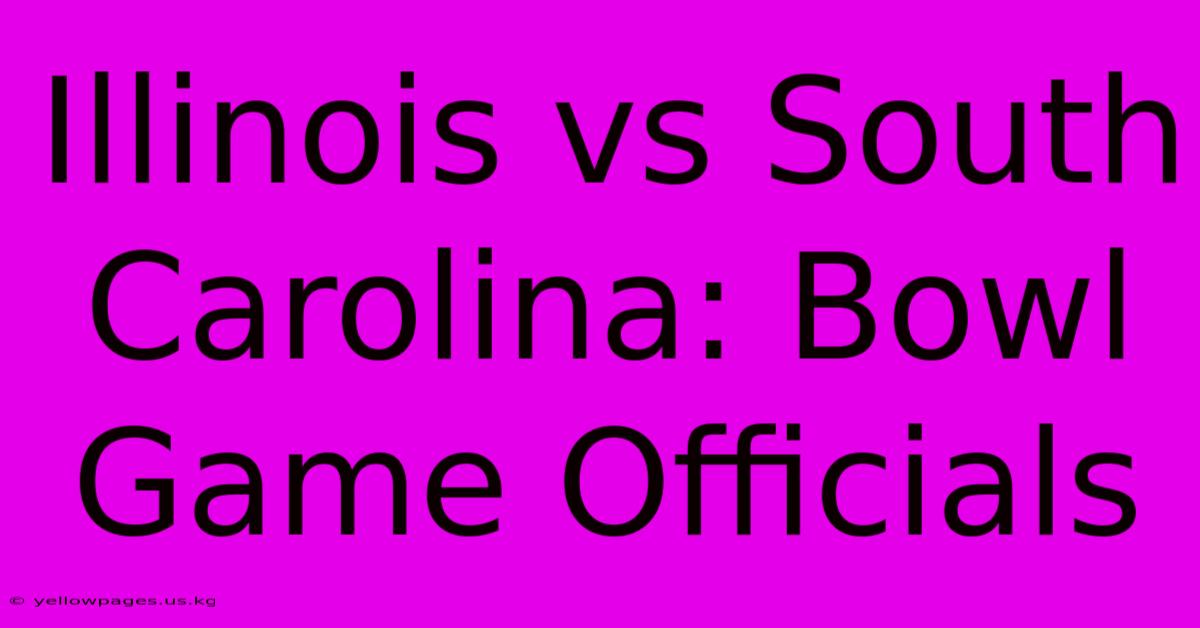Illinois Vs South Carolina: Bowl Game Officials

Discover more detailed and exciting information on our website. Click the link below to start your adventure: Visit Best Website trendingnews.us.kg. Don't miss out!
Table of Contents
Illinois vs. South Carolina: Bowl Game Officials – A Deep Dive into the Crew
The upcoming bowl game between Illinois and South Carolina promises exciting matchups on the field, but behind the scenes, the officiating crew plays a crucial, often overlooked, role in ensuring a fair and smoothly-run contest. Understanding who these officials are and their experience can provide context and perspective for fans watching the game. While specific names and details might not be widely publicized before the game, we can explore the general process of selecting officials and what qualifications they bring to such a high-profile event.
The Selection Process: How are Bowl Game Officials Chosen?
Selecting officials for a bowl game like this one isn't a random process. It involves a rigorous evaluation of experience, expertise, and consistent performance throughout the regular season. The conferences (Big Ten for Illinois and SEC for South Carolina) likely have their own officiating staffs. Bowl organizers often work in conjunction with these conferences to select a crew known for their skill and ability to handle the pressure of a major bowl game.
Key Factors in Official Selection:
- Experience: Officials with extensive experience in high-stakes games, including conference championship matchups or previous bowl games, are highly sought after. Years of officiating experience translates to better decision-making under pressure.
- Consistency: Referees and umpires are judged on their consistency in calling penalties and making judgment calls throughout the season. Consistency ensures fairness and reduces the likelihood of controversial decisions during the game.
- Reputation: Officials with a strong reputation for professionalism, fairness, and accuracy are preferred for high-profile events. Their reputation precedes them, influencing the selection process.
- Training and Evaluation: Continuous training and evaluation are integral aspects of an official's career. Regular evaluations help identify areas for improvement and ensure adherence to the latest rule changes.
Understanding the Roles: More Than Just the Referee
Many people only focus on the referee, but a highly skilled crew comprises multiple positions, each with specific responsibilities:
- Referee: The referee is the head official, responsible for the overall game management and final say on calls.
- Umpire: The umpire's focus is often on the offensive line and backfield. They are crucial for calling holding penalties and other infractions.
- Head Linesman: This official focuses on the line of scrimmage and downfield plays.
- Line Judge: Similar to the head linesman, the line judge helps track and monitor plays along the line of scrimmage.
- Back Judge: Located in the backfield, this official's focus tends to be on pass interference and other penalties occurring downfield.
- Side Judge: Assists the other officials in monitoring the plays and ensuring accuracy of calls.
- Field Judge: Another support official, usually positioned to aid in the accurate measurement of plays and penalties.
Beyond the On-Field Performance: The Impact of Officials
The officiating crew's impact extends beyond the immediate calls made during the game. Their decisions can influence:
- Game Flow: Smooth and efficient officiating contributes to a better pace of play, resulting in a more engaging experience for viewers and players alike.
- Player Safety: Correctly calling penalties helps ensure player safety by enforcing rules that protect players from injury.
- Game Integrity: Fair and accurate officiating maintains the integrity of the game, preserving its credibility and ensuring a fair contest.
While we might not know the specific names of the officiating crew until closer to game day, understanding the process of their selection and the crucial roles they play enhances our appreciation for the game itself. Ultimately, a well-officiated game ensures an enjoyable and memorable experience for all involved, contributing to a successful and fair contest for both Illinois and South Carolina.

Thank you for visiting our website wich cover about Illinois Vs South Carolina: Bowl Game Officials. We hope the information provided has been useful to you. Feel free to contact us if you have any questions or need further assistance. See you next time and dont miss to bookmark.
Featured Posts
-
Cfp Quarterback Journey
Jan 01, 2025
-
Relia Quest Bowl Live Game Blog Alabama Vs Michigan
Jan 01, 2025
-
Aaron Brown Cnn Anchor Dies At 76
Jan 01, 2025
-
Alabama Football 3 Post Bowl Takeaways
Jan 01, 2025
-
Todays College Football New Years Eve
Jan 01, 2025
